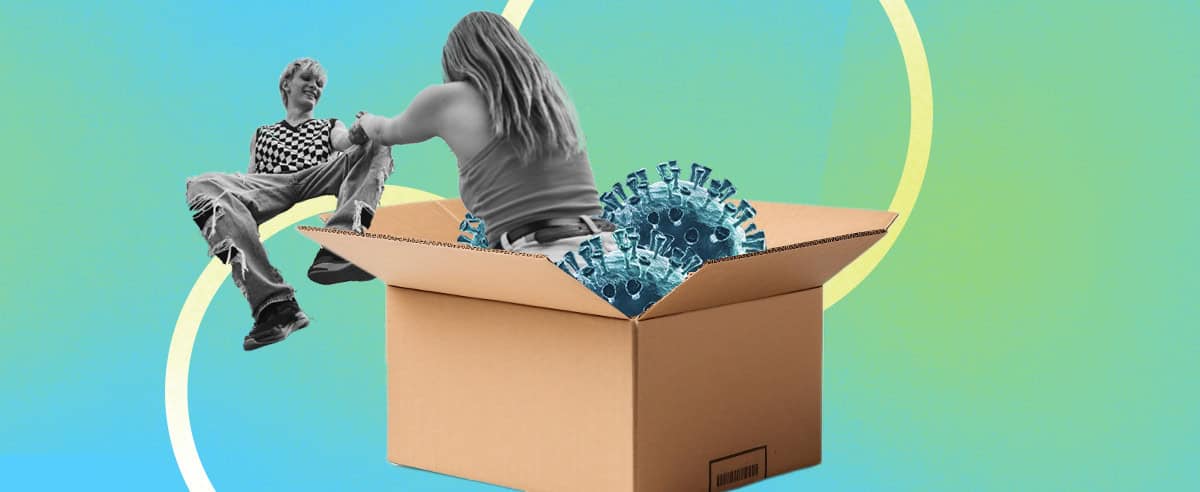In 2024, COVID's lasting effects are still evident. Its impact on livelihoods, health, and food systems has been devastating. While some have fared better than others, the pandemic has undeniably affected us all. Young people, in particular, have borne the brunt of this unprecedented time. Studies have shown that since 2020, the mental health of young people has dramatically declined. But it's not just COVID. The climate crisis and strain on educational settings are also weighing heavily on the minds of our younger counterparts. We sat down to hear one young person's perspective on the effects of COVID, the issues that matter to them, and how politicians can help amplify their concerns by listening and giving them a voice.
Could you please introduce yourself and explain why you felt it was important to share your story about the impacts of COVID-19 on young people's mental health and wellbeing?
I'm a 15-year-old living in a small town in the Netherlands. When the pandemic first hit in March 2020, I was 12 years-old and like many others, I found myself completing most of my schooling from home, and attending online classes instead of the usual in-person ones.
I’ve chosen to share my story, because I believe there are many people who are not comfortable doing so, perhaps feeling ashamed about expressing their experiences during the pandemic. I hope that by sharing my own story, it might speak to others, or give governments more insights into the effect COVID had on young people.
In creating solid support systems in schools, it’s crucial to establish care teams dedicated to addressing mental health challenges and supporting students with essential support. It is also important to cultivate environments where students feel comfortable opening up about their emotions. Educational authorities could help young people by organising lectures or workshops in collaboration with school initiatives like the Municipal Health Services (Gemeentelijke Gezondheidsdiensten (GGD) in the Netherlands and promoting campaigns like the ‘It’s Okay to talk’, campaign from Public Health Scotland.
Can you tell me a bit about what your life was like during the pandemic? How did it affect your family life, school life, and social life?
During the pandemic, we were all confined to our own homes, unable to enjoy familiar comforts like hanging out with friends, visiting family, or attending regular school. Personally, COVID left me feeling isolated, despite occasional meetups with friends, though these meetups never quite resembled those we had straight after school before the pandemic.
With official restrictions on family visits, the situation was particularly challenging, especially considering my rare occasions to see my extended family. Despite these restrictions, we made exceptions to visit my grandparents, who live approximately 2.5 hours away by car.
During the pandemic, instead of going out to shops or restaurants, many young people turned to online platforms like Discord-an instant messaging social platform- joining small communities to maintain social interaction. These online interactions saw a significant increase during COVID and were mostly just for fun, but they provided necessary social interactions.
As for school, initially all classes were conducted online, with only teachers allowed to give their online lessons from their classrooms. However, over time, this was prevented as well, as they too transitioned to remote teaching from home.
When the most challenging phase of the pandemic was over, a select few students, including myself, were allowed to go to school again. This change enabled those most in need of face-to-face teaching to receive better support, typically around three students per class. Later, slowly but surely, everyone could go back to school again.
You said at one point during COVID you felt there was no progression for you? Could you please explain what you meant by this?
Due to the shift to online lessons, many students started losing grip on the workload or felt demotivated. To add to these challenges, our lesson time got shortened from 80 minutes per lesson to 50 minutes, yet we were still expected to complete the same amount of work, leading to an increase in stress and a decrease in motivation.
Completing tests online also made it difficult for students to learn, as there was no way of verifying that it was done by the students themselves and not their parents standing out of view of the camera and telling them the answers.
For this reason, tests wouldn’t count towards any official grade. This led students to question the purpose of studying in the first place, since exams were not counted anyway. Eventually, due to these reasons, our school (and probably many others) decided to let everyone pass and enter their next school year without any way of ensuring they knew all the content from the previous one.
Why do you think it’s important for people such as politicians and school authorities to listen to the experiences and voices of younger people, especially when it comes to the challenges faced during the pandemic.
If politicians listened to our experiences as young people, they would better understand how the pandemic has impacted us. That knowledge could help to mitigate the effects of a potential future pandemic.
Another reason why it’s important is because we’re the next generation. We will be spending the next 50+ years on this planet, and we will be depending on decisions which are being made today. By giving the government, a view of how COVID has affected us in the past, they might be able to do something to mitigate or possibly even prevent crises in the future.
If governments listened to what young people have to say about the terrible learning conditions they’ve experienced, maybe they’d be better equipped to invest in adapting online classes in the future, all the while maintaining necessary safety guidelines. They could, for instance, consider in-person lectures in a big, open-air space for warmer periods, or provide lectures in a theatre or other big space for colder periods.
To keep it short: by listening to our struggles during a pandemic, governments would be better equipped to best support young people during another crisis.
Some researchers have said that COVID allowed young people to have more time for self-discovery and personal growth. Would you agree with this? Please explain.
I would say yes, but it’s not all puppies and sunshine. On the one hand, younger people and teenagers had significantly more time and space to discover themselves and explore their identities. For example, there seem to be more visible LGBTQI+ teenagers since the pandemic began. I’ve personally noticed more queer individuals at school now, compared to four years ago before the pandemic. This might be because teenagers had more time to think about LGBTQI+ issues and understand themselves better, possibly due to having more time to discover themselves during lockdown.
On the other hand, this increased time for self-discovery came at the cost of education and social interaction. While teenagers had more time to explore their identities, they couldn’t go out or hang out with friends, go bowling, or engage in other activities. Shops, cafes, and restaurants were all closed, although for many, the most enjoyable part of being a teenager is spending time with friends and engaging in social activities. The pandemic deprived young people of almost all of these experiences.
Also, the question of self-discovery isn’t limited to spending time alone. While the pandemic forced many to be alone, a big part of self-discovery also happens through social interactions and being part of a community. In-person support groups can help people in their self-discovery journeys, as they are able to receive more information and support. In fact, in my opinion, spending too much time thinking about your identity in isolation can lead to overthinking, mental health issues, and feelings of loneliness.
The EU elections are an important time for Europe. They provide a time for voices to be heard and for a new set of politicians to make new decisions focusing on the issues that matter most to young people.
- As a young person do you think the elections are important? If so, please explain?
- What topics matter most to you as a young person and why?
- What message would you send to politicians about looking after the mental health and wellbeing of young people especially since COVID?
As a teenager or young person, I believe elections are important, particularly national elections, which I consider more important than EU elections. National elections significantly impact the conditions we live in.
In the Netherlands, our parliament is really messing up our future. They decided to remove essential climate policies, like reducing the speed limit. The Coalition Agreement also doesn't mention the word young people (Jongeren), indicating that youth issues are not a priority, and the parliament plans to reduce the number of refugees and asylum seekers, aiming to 'stem the excessive influx.' Recent big cuts to education and science also jeapordise our future.
As a teenager, I’d say the most important issues are education and climate change. Education is vital for young people, as they need to graduate, study, and become a part of society. Education also helps raise awareness, helping people understand different communities better. For example, in a subject called 'Global Perspectives (GP)', we had an assignment on LGBTQI+ issues. This combination of school programmes and relevant topics sparks a lot of conversations among young people. When people discuss these issues, it helps raise awareness rather than hate.
External organisations have also sometimes come to schools to speak about different issues through lectures, plays, Q&A sessions, and debates. These activities provide new perspectives in a fun and engaging way, creating an open environment for learning. Students can also raise their concerns through events like 'Purple Friday,' where they brainstorm and bring up issues with the school administration.
Addressing climate change is also crucial due to current environmental challenges, especially since the Netherlands is removing the CO2 policy, which, in my opinion, is counterproductive. I feel that by increasing the speed limit not only raises emissions but also significantly increases accident rates.
Climate and social inequalities are also interconnected. For instance, in my opinion I think electric vehicles are better for the environment but can be expensive for poor families. These families should receive subsidies to afford such vehicles. In the Netherlands, which is below sea level, climate change could cause significant migration if current trends continue. Although the government has worked hard to create policies to address this, some of these policies have been neglected recently.
My message to our current Parliament is: Get your priorities straight! Increasing funds for education and healthcare and mitigating emissions is far more important than raising the speed limit on highways, which only increases problems. Allowing asylum seekers and refugees could also positively contribute to the economy.
What would you like to do in the future and why?
Later, I’d love to work in the IT sector. I've always enjoyed tinkering with both hardware and software. When I was little, I used to disassemble any technological device that crossed my path, although it wasn’t very appreciated by those around me. I think I would particularly enjoy working in software development. However, I haven’t thoroughly researched specific jobs or opportunities in this field, so I’m open to exploring different ideas.

